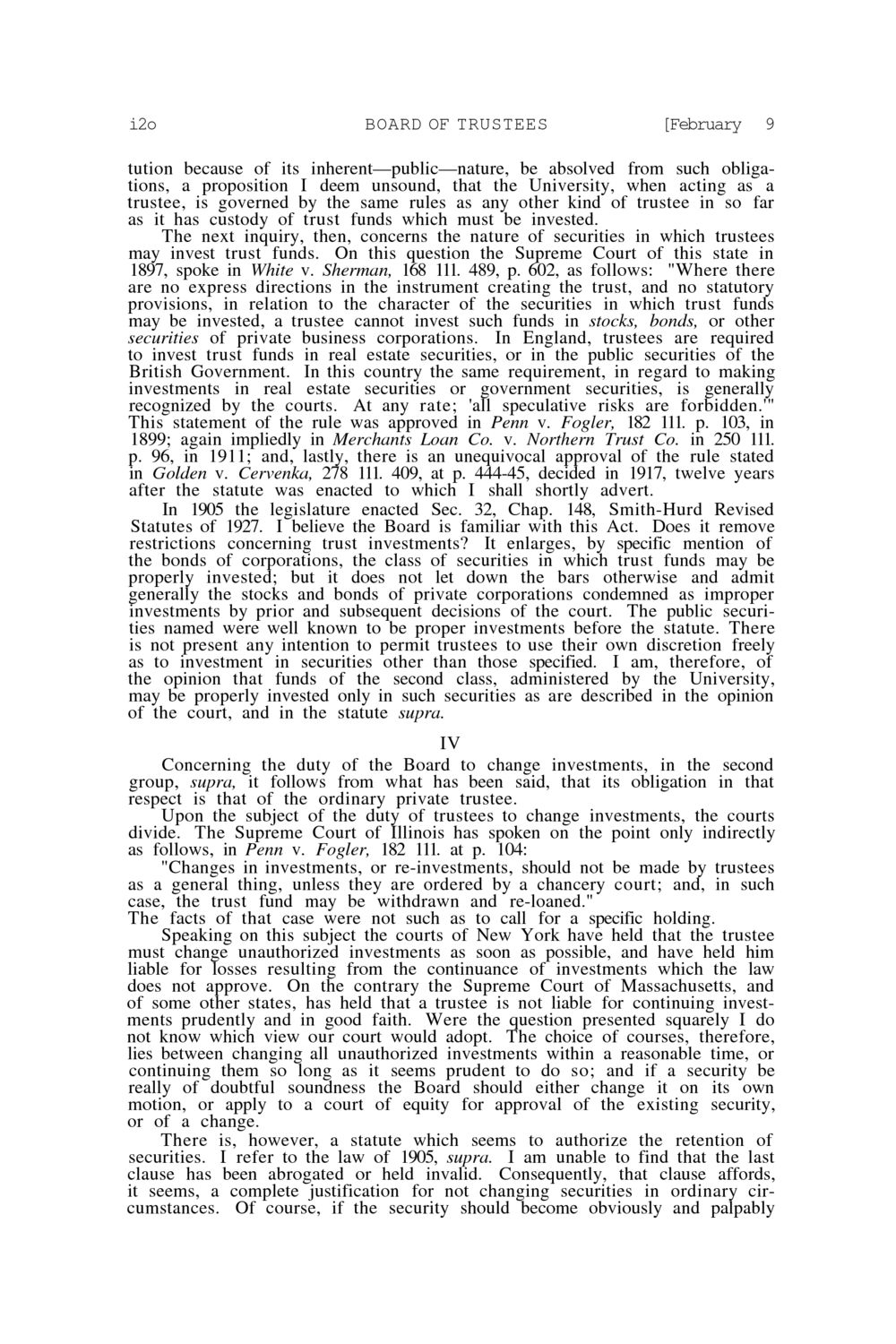| |
| |
Caption: Board of Trustees Minutes - 1936
This is a reduced-resolution page image for fast online browsing.

EXTRACTED TEXT FROM PAGE:
i2o BOARD OF TRUSTEES [February 9 tution because of its inherent—public—nature, be absolved from such obligations, a proposition I deem unsound, that the University, when acting as a trustee, is governed by the same rules as any other kind of trustee in so far as it has custody of trust funds which must be invested. The next inquiry, then, concerns the nature of securities in which trustees may invest trust funds. On this question the Supreme Court of this state in 1897, spoke in White v. Sherman, 168 111. 489, p. 602, as follows: "Where there are no express directions in the instrument creating the trust, and no statutory provisions, in relation to the character of the securities in which trust funds may be invested, a trustee cannot invest such funds in stocks, bonds, or other securities of private business corporations. In England, trustees are required to invest trust funds in real estate securities, or in the public securities of the British Government. In this country the same requirement, in regard to making investments in real estate securities or government securities, is generally recognized by the courts. At any rate; 'all speculative risks are forbidden.'" This statement of the rule was approved in Penn v. Fogler, 182 111. p. 103, in 1899; again impliedly in Merchants Loan Co. v. Northern Trust Co. in 250 111. p. 96, in 1911; and, lastly, there is an unequivocal approval of the rule stated in Golden v. Cervenka, 278 111. 409, at p. 444-45, decided in 1917, twelve years after the statute was enacted to which I shall shortly advert. In 1905 the legislature enacted Sec. 32, Chap. 148, Smith-Hurd Revised Statutes of 1927. I believe the Board is familiar with this Act. Does it remove restrictions concerning trust investments? It enlarges, by specific mention of the bonds of corporations, the class of securities in which trust funds may be properly invested; but it does not let down the bars otherwise and admit generally the stocks and bonds of private corporations condemned as improper investments by prior and subsequent decisions of the court. The public securities named were well known to be proper investments before the statute. There is not present any intention to permit trustees to use their own discretion freely as to investment in securities other than those specified. I am, therefore, of the opinion that funds of the second class, administered by the University, may be properly invested only in such securities as are described in the opinion of the court, and in the statute supra. IV Concerning the duty of the Board to change investments, in the second group, supra, it follows from what has been said, that its obligation in that respect is that of the ordinary private trustee. Upon the subject of the duty of trustees to change investments, the courts divide. The Supreme Court of Illinois has spoken on the point only indirectly as follows, in Penn v. Fogler, 182 111. at p. 104: "Changes in investments, or re-investments, should not be made by trustees as a general thing, unless they are ordered by a chancery court; and, in such case, the trust fund may be withdrawn and re-loaned." The facts of that case were not such as to call for a specific holding. Speaking on this subject the courts of New York have held that the trustee must change unauthorized investments as soon as possible, and have held him liable for losses resulting from the continuance of investments which the law does not approve. On the contrary the Supreme Court of Massachusetts, and of some other states, has held that a trustee is not liable for continuing investments prudently and in good faith. Were the question presented squarely I do not know which view our court would adopt. The choice of courses, therefore, lies between changing all unauthorized investments within a reasonable time, or continuing them so long as it seems prudent to do so; and if a security be really of doubtful soundness the Board should either change it on its own motion, or apply to a court of equity for approval of the existing security, or of a change. There is, however, a statute which seems to authorize the retention of securities. I refer to the law of 1905, supra. I am unable to find that the last clause has been abrogated or held invalid. Consequently, that clause affords, it seems, a complete justification for not changing securities in ordinary circumstances. Of course, if the security should become obviously and palpably
| |